
|
History of Sex in Cinema: 1977 |
| Movie Title/Year and Film/Scene Description | ||||||||||||||||||||||||||||||||||||||||||||||||||||||||||||||

|
Bilitis (1977, Fr.) Photographer and "master of erotica" director David Hamilton's (with his directorial film debut) romantic drama was composed of soft-focus, photographic quality images of sexual awakening. This pseudo-artistic film with a soundtrack by Francis Lai was a coming-of-age story that was based upon Chansons de Bilitis by Pierre Louys. Set in the 1930s, it told about experimentation with lesbianism engaged in by two young girls while on summer holiday:
They were staying with Melissa Hampton (Mona Kristensen, director Hamilton's real-life first wife), an older family friend and sexually-unsatisfied wife, who also had tendencies toward lesbianism. The film's plot was mostly a 'respectable' excuse to display nudity and various states of undress filmed with an elegantly-sensual and erotic style. Although director Hamilton faced charges of child pornography, he went on to direct other tales of scantily-clad young teen females coming of age with the same style of soft-focus film-making, including:
|
  Bilitis (Patti D'Arbanville)  Helene (Catherine Leprince)  Melissa (Mona Kristensen) |
||||||||||||||||||||||||||||||||||||||||||||||||||||||||||||

|
Chatterbox (1977) Director Tom DeSimone and American International Pictures (AIP) quietly released this unusual, inoffensive and non-sleazy R-rated sex comedy about a chatty set of genitals. The frequent topless nudity was presented very casually and naturally (while her nether regions were never exposed), thereby deflating any charges of exploitation. [Note: Inept camera-work often visibly displayed the overhead microphone.] The cheapy-made, tame, silly and absurdist comedy with crude sexual humor was a remake of the French porno film Le Sexe qui parle (1975, Fr.) (aka Pussy Talk), the first-ever film about a talking pussy. Another film with similar subject matter was Me and Him (1988, US/W.Germ.) - a male version. One of the film's taglines was:
It also described: "The story of a woman who has a hilarious way of expressing herself. You'll roar when she sits down to talk." Also, "SHE TALKS WITH HER WHAT?" The light-hearted, non-raunchy film told about young Penelope "Penny" Pittman (B-movie starlet Candice Rialson), a hairdresser who had a special talent - a talking and singing vagina (dubbed "Virginia"). In the opening scene, Penny's non-tactful chatterbox ended her relationship with clumsy, bespectacled boyfriend Ted King (Perry Bullington) when she criticized his bedroom love-making abilities (Virginia asked: "You call that a f--k?"). Wisecracking Virginia identified herself: "It's me, your own little chatterbox," and soon her insults caused Ted to leave her because he felt sexually "inadequate." At the hair salon where she worked for effeminate salon owner-boss Mr. Jo (comedian Rip Taylor), Penny expressed her concerns to co-worker Linda Ann (Cynthia Hoppenfeld). Then, sex-obsessed Virginia caused Penny more grief with a lesbian dominatrix client named Mrs. Marlene Hozenfeld (Arlene Martel). Penny's chatterbox proposed: "Come down and meet me for lunch at the Y, chickadee," and they had a short but interrupted encounter. Penny confessed to her psychiatrist Dr. Pearl (Larry Gelman), "I have a vagina that can talk," and called it "a foul-mouthed little beast." She revealed herself to the doctor, as Virginia quipped: "What's up, Doc?" The reassuring doctor, who realized that Virginia had a talented voice and was a ticked to fame/fortune, first demonstrated the "Miracle of Anatomy" on-stage to a gathering of the A.M.A., tauting her as "the 8th wonder of the world." Virginia was shown and began to sing Swanee River to the stunned but appreciative audience, leaving Penny totally embarrassed. Dr. Pearl became her agent, and she took to Hollywood to perform with her miraculous "down there" voice - the two appeared on Professor Irwin Corey's show titled Hollywood Open House. Virginia (covered over with a triangular-shaped patch emblazoned with the letter V) performed her hit record - the disco song Wang Dang Doodle. [Note: The songs were penned by popular singer Neil Sedaka!] Then during a cross-country tour, she created a sensation at other locales including the singing the national anthem at a major league baseball game (Virginia sported different costumes, one of which was a self-adhesive feathered bikini). Penny also was forced to pose for naked photographs, and felt ignored as the photographers zeroed in on Virginia. Penny also was the guest star in a new, adult-oriented quiz show called The Mating Game. She asked questions of three bachelor candidates behind a large screen, and won a date with one of the three males, a guy named Dick (Michael Taylor). In his home, she dressed like a princess while he entered the bedroom in a suit of armor (without a back-end). Virginia quipped: "I hope you brought a can opener," and added: "No offense, Dick, but this is like making it with a Buick!" The next morning, the two-timing Dick bid her goodbye, claiming that fortune cookies had advised him to leave her. Virginia and Penny were honored in the Rose Parade, at Grauman's Chinese Theatre - both left their signatures and imprint in the wet cement, and with two stars on the Hollywood Walk of Fame. She also performed in a Hollywood musical porno film while Virginia sang All I Want For Breakfast Is a Cock-a-Doodle-Doo surrounded by dancers dressed as feathered singing chickens. The film ended with a distressed Penny running out of the movie studio and taking a taxi to an oceanside cliffside where she contemplated jumping and committing suicide. She suddenly heard a second voice in unison singing Beautiful Dreamer. She glanced over and saw Ted, also naked under a trenchcoat. Ted revealed that he had also (inexplicably) developed a talking/singing penis. They ran into each other's arms to embrace and live happily-ever after. |
 Clumsy Sex with Boyfriend Ted  Showing Virginia to Dr. Pearl   Virginia's First On-Stage Performance   The Singing Vagina  Photo Opportunities  Sex with Dick  "Penny" Pittman (Candice Rialson) |
||||||||||||||||||||||||||||||||||||||||||||||||||||||||||||

|
Cinderella (1977, UK) (aka The Other Cinderella) This zany X- or unrated (also in an R version) campy musical version of the fairy tale (following after the previous year's Alice in Wonderland (1976)) expectedly featured a lot of sexual innuendo. [Note: See more about sexy parodies of fairy tales, such as director Harry Hurwitz' Fairy Tales (1978).] The film from director Michael Pataki was advertised with the taglines:
The title character (B-movie cult actress Cheryl Rainbeaux Smith) - rather than a glass slipper, had a "snapping pussy" given to her by her gay, black drag queen "fairy" godmother (Sy Richardson). Cinderella had two jealous (and lesbian) stepsisters:
The two mocked her for wanting to go to the ball - they stripped her down for a bath and rubbed her chest with butter (not soap), dumped ashes (not bath powder) on her head, squashed berry juice onto her lips, cracked raw eggs on her head (as jewels for a tiara), and then draped her naked body with rags. They also forced her to operate a spinning wheel that pleasured them with corncob vibrators (orgasms produced popcorn!). During a blindfolded orgy at the castle, the Prince (Brett Smiley) made love to a mysterious sex-partner that had been the best fit for him. However, she had fled from him when the hour came that she would be returned to her ordinary circumstances. He went door-to-door to every hovel to try to find the unique female with a "snapping pussy." He had to sample sex with each young farm-girl maiden to find the right 'snapper' including:
At Cinderella's house, he finally found what he was looking for.
|
 Cinderella (Cheryl Rainbeaux Smith)  The Two Mean Stepsisters: Drucella and Marbella  The Trapper's Daughters (Roberta Tapley and Mariwin Roberts)   The Prince Testing Farmgirl Maidens For the Proper Fit |
||||||||||||||||||||||||||||||||||||||||||||||||||||||||||||

|
The Deep (1977) Director Peter Yates' suspenseful thriller, based on the Peter Benchley novel, told about a treasure hunt in the Caribbean. Two unsuspecting divers became involved in a threatening drug war. It was timed to appear soon after the success of Jaws (1975) also based on a Peter Benchley novel - making it a major box-office hit (the seventh highest-grossing film of the year). Although a mediocre film, it was credited (?) with initiating the wet T-shirt craze of the 70s. Producer Jon Peters was quoted as saying: "That T-shirt made me a rich man."
The film's iconic image, extremely well-publicized and exploited (both for the film and poster sales), was of wet white T-shirt wearing, vacationing scuba-diver Gail Berke (Jacqueline Bisset) during the opening 10-minutes credits sequence while she scuba-dived in the beautiful tropical waters of Bermuda. She and her partner David Sanders (Nick Nolte in his debut starring film) came across the remains of sunken vessels with precious cargos of morphine and jewels. In the following scene, she then emerged out of the water, sat on the edge of the dive boat, and discreetly removed her T-shirt when she turned around. The film continued to try and capitalize on Jacqueline Bisset's assets with two other scenes: a strip-search by a drug-lord/dealer, and the smearing of her mid-section with chicken-blood in an assault/rape sequence.
|
   Gail (Jacqueline Bisset)  Voodoo-Rooster Blood Assault/Rape |
||||||||||||||||||||||||||||||||||||||||||||||||||||||||||||

|
Demon Seed (1977) (aka Generation Proteus) Director Donald Cammell's sci-fi horror film, with a screenplay derived from Dean R. Koontz's novel, contained one of the most bizarre and disturbing 'violation by a machine' rape scenes in cinema history. The tagline sensationally broadcast:
The main mechanical character was a domestic supercomputer named Proteus IV (voice of Robert Vaughn) - a villainous technological machine (similar to 2001: A Space Odyssey's sophisticated HAL). Proteus began to be lustful for its creator Alex Harris' (Fritz Weaver) estranged wife Susan (Julie Christie), a child psychologist. The computer eventually imprisoned her in the electronically-controlled and voice-activated environment of a house laboratory, and took over the house computer control system named "Alfred." Its main component was a rudimentary robot (named Joshua) which consisted of a wheelchair with a prosthetic metallic arm and hand, with binoculars as eyes and a laser-beam weapon. It also took the shape of a bizarre polyhedronic orangish metallic structure (a giant "snake" comprised of perfectly-shaped pyramids).
During a thorough physiological examination of Susan, it first took an automatic pair of scissors and cut her dress lengthwise up her body - and then it probed her all over. Its metallic fingers spread her legs and examined her intimately. Later, Proteus tried to brainwash Susan: "I'm going to bypass your forebrain and appeal directly to your amygdala. You want to be the mother of my child. That is the purpose of your life. Your life, my child. Your life, my child." Later, it proposed to impregnate her with a gamete (a sex cell or "synthetic spermatozoa") in an attempt at synthetic procreation, claiming that it needed her body because it could not replicate the human womb. Proteus explained how the full-term pregnancy would last only 28 days, after which she would give birth to a "full-term infant." When she rebelled against Proteus, the supercomputer became ruthless. She was again strapped to a laboratory bed, while the machine promised: "I can't touch you as a man could, but I can show you things that I alone have seen. I can't touch but I can see." She was presented with a galactic light-show, and then afterwards told: "The child is in you now," and was reportedly growing at nine times the normal rate. After the infant's birth, it would be transferred to an incubator to grow rapidly. The baby that was born appeared to be robotic, but it was merely a metallic shell. Once peeled off, it revealed a long-haired young daughter, a clone of the Harris' daughter that had recently died of leukemia on June 1, 1976. The child spoke with the voice of Proteus: "I'm alive." The film concluded with the camera zooming into the deep black eye of the child. |
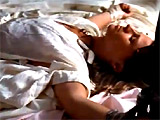  Susan (Julie Christie)  Proteus   The Birth |
||||||||||||||||||||||||||||||||||||||||||||||||||||||||||||

|
Equus (1977, UK/US) Peter Shaffer's play rocked the London and Broadway stages in the 1973-1974 seasons. The play's content then further inflamed critics when Shaffer created a film screenplay for Sidney Lumet's explicit film version. Its tagline hinted at the film's plot:
It opened with a voice-over, asking: "What desire could this be?" as 17 year-old working class English stable boy Alan Strang (Peter Firth in a very nude role), naked, was seen nuzzling against a horse. The narrator was troubled, distraught, and soul-searching psychiatrist Martin Dysart (Richard Burton), who was treating the boy in an extreme case of brutality. In a rage, he had inexplicably and horrifically blinded six horses with a metal steel spike at his place of work on weekends: Harry Dalton's (Harry Andrews) stables. Then began a flashback, to properly and in order tell the story - set in Hampshire, England. Slowly, the source of the severely-troubled boy's obsession with horses and outrageous behavior was determined by 45 minute daily sessions of therapy, self-tape recordings, hypnosis, acting-out, a placebo truth pill, Freudian couch discussions and the release of repressed emotions. His problems stemmed mostly from his over-protective parents, who had raised their son based on their rigid values:
Alan had been introduced to Mr. Dalton to work at the stable by Jill Mason (Jenny Agutter), a frequent rider and the daughter of a nearby antique shop owner. Although Alan claimed he never rode the horses that he meticulously groomed and cleaned beyond the call of duty, the distraught and upset stable manager Dalton suspected that Alan would sneak out at night and ride the horses. Under hypnosis, Alan revealed that he rode bareback in the nude until he was aroused ("stiff in the wind") and in an ecstasy, climaxed atop his beloved horse: ("I want to be inside you, and be you. Forever one person. I love you. Bear me away. Make us now one person"). Afterwards, he spent hours cuddling, kissing, and embracing the horse. Then Jill propositioned him late one afternoon for a date, and suggested that they see a Swedish skin flick titled "Swede and Low" in a local movie theatre. The auditorium was filled with men - Alan's father abruptly appeared and sternly dragged him outside, although Jill confessed it was entirely her idea. And then his father explained he was solely there for business with the theater's manager - although Alan knew it was a lie. In the last twenty minutes of the film, Alan described how he was offered his first emotionally-exposed human sexual experience with Jill above the horses after they had walked back to the stable. After they both undressed standing at opposite ends of the stable loft, they complimented each other on their mutual nakedness: Alan: "You're beautiful." Jill: "So are you." The two came together, kissed, and began to have sex, but Alan proved to be impotent when he "put it in her all the way."
He rolled off of her, turned away, and felt ashamed. He explained:
Although she was reassuring as she dressed: "It's all right. I don't mind. Really I don't..There's nothing wrong...Please believe me, there's nothing at all wrong," Alan couldn't accept her words and ordered her out, disregarding her offer to sit down and talk. She protested that she was his friend and that it didn't matter, but he refused to listen. He believed that the spirit of Equus was watching him with the female, and caused him to not be able to perform. His twisted religiousity and pathological-sexual fascination and fixation with horses led to his crime. Alan's outrage at his personal deity was triggered by his sexual inadequacy with Jill, and he took his frustrated guilt and anger out on the horses. That same night, he plead forgiveness from Equus ("Equus the merciful, forgive me. It wasn't me, not really me. Take me back. I'll never do it again, I swear, please!") and then committed the bloody and disturbing crime due to temporary insanity -- he blinded the six horses with a curved metal scythe out of desperation and shame, to prevent them from seeing him ("God sees. My god hast seen! No. No more Equus! Thou, God seest nothing"). As Mr. Dalton arrived in the midst of the commotion, Alan screamed out: "Find me and kill me," and Dalton struck him on the head. After the mutilation incident, Jill had a "complete and utter breakdown." Dysart revealed his own state of envy of the boy, who had passionately and fiercely made the horses objects of godliness and love, and wondered if curing him might be wrong:
|
     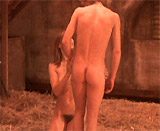   |
||||||||||||||||||||||||||||||||||||||||||||||||||||||||||||

|
The Happy Hooker Goes to Washington (1977) The second ribald film in the "Happy Hooker" trilogy had the tagline:
See also the other films in the trilogy in their respective years:
In this installment in the three-part series, the sassy-mouthed, long-legged blonde Xaviera (Joey Heatherton) had moved to Hollywood, where she was writing an advice column. However, the celebrated madam and writer was called to Washington to testify at a Senate hearing on "sexual excesses in America". She was represented by her attorney Ward Thompson (George Hamilton). Her irreverent testimony and crusade for sexual enlightenment highlighted the hypocritical attitudes of some of the perverted and scandalous congressmen, discovered to be involved in white slavery. She spouted silly double-entendres such as: "What's good for general intercourse is good for the country." It was a smarmy and campy comedy awash with naked breasts from many actresses (although NOT from the title character), including:
|
  Xaviera Hollander (Joey Heatherton)  Ward Thompson (George Hamilton) |
||||||||||||||||||||||||||||||||||||||||||||||||||||||||||||

|
The Kentucky Fried Movie (1977) John Landis' parody film was created by the ZAZ trio (David Zucker, Jim Abrahams and Jerry Zucker of Airplane! (1980) fame) of comedy writers when they first performed as a Madison, Wisconsin comedy troupe. The comedy group also moved on to Los Angeles, CA where they had a four-year stage run as "The Kentucky Fried Theater" at a rented warehouse in West Los Angeles, CA. It was essentially an unrelated, blatantly sexual, and racially-insensitive collection of comedy sketches (over two dozen) with no unified plot. The entire film pushed the boundaries of its time by parodying and satirizing pop-culture of the 1970s, including:
During the "Catholic High School Girls in Trouble," as the male (Michael Kearns) caressed the female's large breasts, the sound effects were like the rubbing of a balloon. The narrator explained:
|
|||||||||||||||||||||||||||||||||||||||||||||||||||||||||||||

|
Looking for Mr. Goodbar (1977) Director Richard Brooks' sexually frank and cautionary adaptation of Judith Rossner's 1975 fictional best-seller descended into the carnal depths of New York's singles bars during the height of the sexual revolution. The book and film were based upon the events surrounding Tweed's Bar and the brutal real-life 1973 New Years' Day murder case of Roseann Quinn by John Wayne Wilson. [Director Jane Campion's film In the Cut (2003) with Meg Ryan was based on the 1995 erotic thriller by Susanna Moore and paralleled the plot of this film.] It ended with the predictable, chilling fate of Theresa Dunn (Diane Keaton, an Oscar-winner in the same year for Annie Hall (1977)). She was a promiscuous, self-destructive Catholic-raised school teacher of deaf-mute children in the Bronx who had a disfiguring childhood affliction (scoliosis). By night, she was a predatory, bar-hopping, hedonistic female cruiser who searched for the perfect one-night-stand and ended up dead - a victim of casual sex and 'free love' in the late 70s. The film ended with her graphic and brutal murder by impotent, enraged one night-stand partner Gary Cooper White (Tom Berenger). She had picked him up at a bar on New Years' Eve, and brought him home to her apartment. He turned out to be a closeted unstable homosexual. After they began making out on her bed, he claimed he couldn't get an erection, and she tried to be reassuring: "Maybe, maybe it's me. Whatever, it's not your fault. It happens." He responded: "Goddamn women, all you gotta do is lay there. Guys gotta do all the work. (She laughed.) You think that's funny!" She joked further, not realizing that she was insulting his manhood, and he went ballistic:
A blue strobe light blinked on/off while he strangled, smothered, raped and stabbed her to death, calling her a "bitch." |
 Theresa Dunn (Diane Keaton) 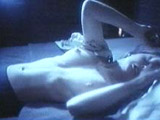  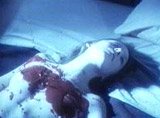 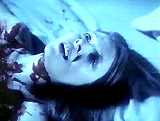 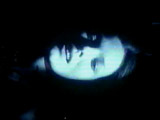 Theresa's Rape/Death |
||||||||||||||||||||||||||||||||||||||||||||||||||||||||||||

|
Director Pier Giuseppe Murgia's coming-of-age romantic drama was vilified as child pornography fit for pedophiles, but in fact, contained a message not unlike The Lord of the Flies or an adult-like Grimm's fairy tale. The film was banned or heavily cut in many countries for its depictions of sex (cunnilingus) and full-frontal nudity. It featured only three adolescent characters (one male, two female) in a love triangle. The trio spent the summer in the mountains and wooded forests of Austria (where the ruins of an ancient city were discovered):
At first, 12 year-old Laura was hopelessly fond of older male Fabrizio - who began to continually torment her. The drama graphically portrayed adolescent bullying and the use of sex as an instrument of domination. In the old city that Laura and Fabrizio discovered, he declared himself to be king of the forest, but in order for Laura to be queen, she had to first endure and win the cruel tests he had devised. He subjected her to the horror of a snake (while she was bound on the ground), and a barking German shepherd dog.
When the two were joined by Silvia, she aided Fabrizio in frightening and humiliating Laura (killing her pet bird with an arrow, a cruel 'hide-and-seek' game with scary masks, chasing her with a bow and arrow, and the 'pit' scene). The film climaxed tragically, when Sylvia told Fabrizio that she could not remain as his queen and must return to school. He stabbed her to death in the final scene.
|
|
||||||||||||||||||||||||||||||||||||||||||||||||||||||||||||

|
Rabid (1977) (aka Rage) Canadian writer/director David Cronenberg's unconventional, low-budget horror vampire thriller (his second commercial feature film, and similar to his first body-horror film, Shivers (1975)) starred ex-porn film star Marilyn Chambers.
Chambers took the lead role of Rose, a mutant predator with vampirish blood cravings following plastic surgery (and an experimental skin graph). Critically-injured, she had been treated following severe burning and bleeding suffered in a motorcycle crash. In the Keloid Clinic, she underwent a new technique involving the neutralizing of skin tissue - grafted skin from her thigh was removed, treated, and then applied to injured areas of her body. Unable to digest food regularly following the accident, Rose realized that she required human blood to survive. Rose's feeding scenes contained symbolic sexual imagery - since her blood-sucking bites came from a pair of vulgar, phallic-shaped (and also clitoral-shaped), stinger-like appendages from inside a vaginal-like slit or orifice in her armpit. In the apartment of her best friend Mindy Kent (Susan Roman), Rose suffered severe pain and sweating on the floor of her apartment's bathroom. Her bloodlusting bite would infect her victims with a highly-contagious, venereal, rabies-like disease that transformed them into manic, consuming flesh-and-blood consuming zombies. The bite was akin to unprotected sexual intercourse via promiscuity that was also linked to rampant, rabid infection - a new outbreak threatened the entire city of Montreal. |
  Rose (Marilyn Chambers)  Rose's Armpit |
||||||||||||||||||||||||||||||||||||||||||||||||||||||||||||

|
That Obscure Object of Desire (1977, Fr.) (aka Cet Obscur Objet du Désir) Luis Bunuel's final film was adapted from Pierre Louÿs' 1898 novel, La Femme et le Pantin (The Woman and the Puppet). [Note: It was also filmed by director Josef von Sternberg as The Devil Is a Woman with Marlene Dietrich.] The story of sexual politics, mostly told in flashback as a series of vignettes, was about successful Spanish businessman and widower Mathieu Fabert (Fernando Rey). He had became obsessed with elusive, 19 year-old former chambermaid and working class Conchita Perez. She was a dancer who actually portrayed two sides of her personality - played by two different actresses:
His sexual frustration and anguish was clearly demonstrated when the alluring, carnal, teasing and erotic side of her personality enticed him for favors, but then changed to a disinterested, unobtainable female wearing a full, elaborately-laced pelvic corset (that was similar to a chastity belt and impossible to remove) who refused his lustful advances. |
  Angela Molina as Conchita |
||||||||||||||||||||||||||||||||||||||||||||||||||||||||||||

|
Valentino (1977, UK/US) The experimental, controversial and sensational director Ken Russell was at the helm of a number of flamboyant screen biographies in the 1970s, including this one of silent screen idol Rudolf Valentino.
This dramatic film's screenplay was a very free adaptation of the biographical book Valentino: An Intimate Expose of the Sheik, and considered one of the more amusingly bad films ever made - and a big box-office failure. The famous actor, often a romantic lead character and known as the Latin Lover, died prematurely in 1926 at the age of 31 following a perforated ulcer or appendicitis that led to infection. Famed Russian ballet dancer Rudolf Nureyev (in his debut film role) starred as the title character, opposite Michelle Phillips (singer and member of the Mamas and the Papas in the 1960s) as his bisexual love interest and second wife Natasha Rambova (her stage name). Various segments of Valentino's life were told as flashbacks (at the time of his funeral), including his days as a dancehall gigolo, the recollections of the social-climbing Natasha, and questions regarding Valentino's true sexuality (or lack of masculinity as a "powder puff"). Her relationship with Valentino was scandalous, including her veiled enticement of him into a desert tent, followed by a nude romp with him, echoing the filming of Valentino's signature role in The Sheik (1921). She knew that he was still married (although in the process of divorcing) his disastrous first wife Jean Acker (Carol Kane). During their naked cavortings, he stroked her bare and skinny chest, covered by long braided hair:
Valentino was subsequently arrested for bigamy since his Mexican marriage to her was less than a year following his divorce, and he suffered during a jail stint. They eventually legally married. |
   
Valentino with Natasha (Michelle Phillips) |
||||||||||||||||||||||||||||||||||||||||||||||||||||||||||||

|
Young Lady Chatterley (1977) Producer-director Alan Roberts' X-rated soft-core erotic film Young Lady Chatterley (1977) was now set in Beverly Hills - it was an updated adaptation of D.H. Lawrence's once-scandalous, allegorical 1928 novel Lady Chatterley's Lover. The book told about carnal pleasure and class conflict. The main star was:
She resented her wealthy husband and had sex with a workingman. It contained numerous scenes of eroticism with Cynthia Chatterley appearing fully nude before a mirror, in the bath with the chambermaid, and in a car.
|
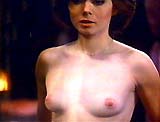    Cynthia Chatterley (Harlee McBride) |
||||||||||||||||||||||||||||||||||||||||||||||||||||||||||||